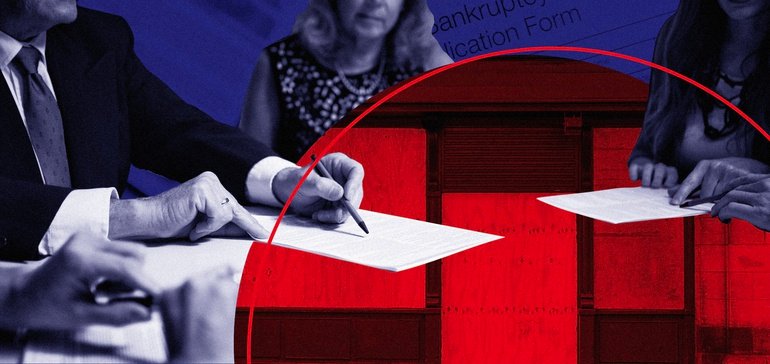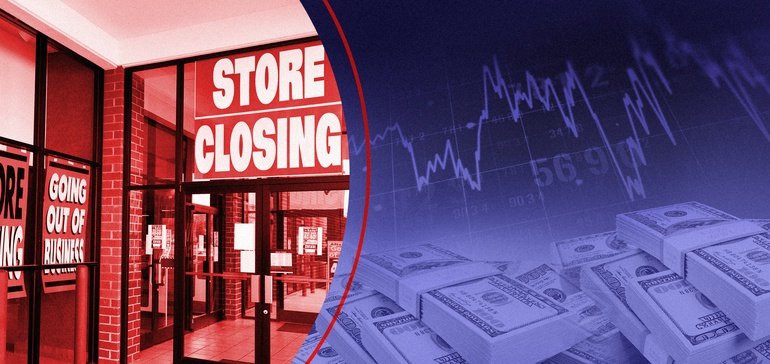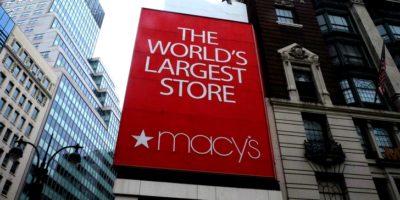Welcome to the profitable world of retail chapter
In August 2019, a gaggle of small collectors made an enchantment to the courtroom overseeing Sears Holdings’ chapter.
This was rather less than a 12 months after the corporate filed its long-anticipated Chapter 11 and a number of other months after the remaining Sears shops have been bundled and offered to former CEO Eddie Lampert and his hedge fund. At that time, Sears Holdings was primarily a company husk — a celebration to litigation and the holder of a large authorized invoice.
The charges that Sears Holdings owed its attorneys and advisers since submitting for Chapter 11 had then reached almost $170 million. Some collectors, which included a number of the malls’ suppliers, argued this doubtless left Sears Holdings administratively bancrupt. They fearful the corporate owed extra in administrative claims — together with each charges to its advisers in addition to funds to distributors and different collectors — than it may presumably pay.
Collectors requested the courtroom to restrict how a lot could be paid out to Sears’ employed chapter advisers as a option to steadiness the pursuits of attorneys and different professionals with these of different collectors, “who could also be staring down the barrel” of massive monetary losses.
If Chapter 11 bills are a hearth, time and complication are like a heavy wind that may unfold them past management. There’s a hard-to-miss irony to the formidable bills piled onto an organization going by way of a authorized course of meant to guard it from monetary implosion. But for many who file, the bills are a easy value of doing enterprise, and doubtlessly effectively price it if a retailer is ready to shed tons of of hundreds of thousands of {dollars} in debt and unprofitable leases, to offer it a second probability.
These bills for the corporate are additionally a significant supply of revenue for others. The prices of chapter aren’t restricted to the payments from attorneys and restructuring consultants. Finance suppliers, too, cost exorbitant charges for chapter loans which have been proven to be remarkably secure from fee default. The businesses’ personal executives also can reap windfalls because the retailers they run careen into chapter 11.
Retail’s costliest bankruptcies
From 2016 by way of 2020, retailers and their estates have logged about $2 billion on chapter professionals throughout greater than 120 circumstances, in keeping with Debtwire information offered to Retail Dive. In 2020 — a file 12 months for Chapter 11s within the trade — retail chapter circumstances racked up greater than $500 million in skilled bills.
Since 2016, the costliest of all was Sears Holdings, whose skilled charges and bills got here out simply shy of $250 million when all was stated and performed, in keeping with Debtwire information.
The runner up was one other lengthy, tortured retail chapter: Toys R Us, at $207.9 million. The toy retailer filed in 2017 with hopes of a reorganization or sale, however a poor vacation efficiency led to its wreck in chapter, with lenders opting to liquidate the corporate’s shops months after it filed.
The 20 costliest retail bankruptcies since 2016
Complete charges paid to professionals by debtor corporations whereas in chapter
| Firm | Complete |
|---|---|
| Sears Holdings | $249,496,213 |
| Toys R Us | $207,879,850 |
| 9 West | $104,152,042 |
| J.C. Penney | $61,649,943 |
| Neiman Marcus | $54,435,530 |
| Payless (2019) | $53,783,828 |
| J. Crew | $52,283,469 |
| Claire’s Shops | $50,985,014 |
| Tailor-made Manufacturers | $40,333,505 |
| Centric Manufacturers | $38,175,968 |
| Without end 21 | $38,082,314 |
| Sports activities Authority | $37,552,085 |
| Ascena Retail Group | $35,693,607 |
| Payless (2017) | $34,720,774 |
| Aeropostale | $34,711,333 |
| Gymboree (2017) | $25,237,048 |
| Gymboree Group (2019) | $24,733,654 |
| Brooks Brothers | $23,890,111 |
| Pier 1 Imports | $22,950,106 |
| Shopko | $22,009,111 |
Supply: Debtwire information
These circumstances have been outliers. Even the subsequent costliest retail chapter, 9 West from 2018, value greater than $100 million much less in charges than Toys R Us. On common, retailers spent about $15.5 million in Chapter 11 between 2016 and 2020, in keeping with Retail Dive’s evaluation of Debtwire information. (Debtwire’s information relies on courtroom data, which could not have included all payment functions for the total 12 months of 2020 by the point the info was tabulated.)
That $15.5 million determine is dwarfed by the bigger circumstances, nevertheless it’s nonetheless a hefty value borne by corporations which are in chapter due to liquidity shortages or insolvency. It is also some huge cash exiting corporations which are closing shops and shedding workers, who can lose out on severance, pension advantages and the worth of firm inventory choices when their employer goes bust.
Retail is just surpassed in whole skilled payment bills by the oil and fuel trade, which has gone by way of an enormous wave of bankruptcies in recent times. However Josh Friedman, international head of restructuring information at Debtwire, famous that whereas the oil and fuel trade had about 100 extra chapter circumstances than retail and generated extra authorized prices in mixture since 2016, retail has been about 40% costlier on a per-case foundation.
“Retail is near doubly as profitable as another sector moreover oil and fuel over the previous few years,” Friedman stated. “Retail circumstances are likely to run longer, and infrequently culminate in sale processes or liquidations. Usually they do not file with a plan in place. They naturally result in excessive advisory charges and costlier chapter processes.”
Court docket data detailing spending on professionals may underestimate the general prices to each retailers and different events in a chapter, in keeping with Lynn LoPucki, a distinguished professor on the College of California, Los Angeles College of Legislation, who factors to some bills that do not undergo the courtroom approval course of for varied causes. “There’s much more cash that’s spent than exhibits up in these skilled charges,” LoPucki stated. “Doubling the quantity for the courtroom awarded charges offers you a tough estimate.”
A method retailers can defray these prices is to enter courtroom with a plan that already has the help of lenders. Referred to as a prepackaged chapter, this will considerably scale back the period of time — and with it, the expense — spent in courtroom.
“Finally, corporations desire a prepack. We see that with Belk, one thing quick and crisp to maintain down bills, as a result of they are often astronomical,” stated Reshmi Basu, restructuring editor with Debtwire, referencing Belk’s swift Chapter 11. “All people needs a fast stint in chapter if doable, however typically you may’t.”
But, even a prepackaged chapter plan does not assure low prices. Among the many costliest retail bankruptcies in current historical past, in keeping with Debtwire’s information, are Neiman Marcus, J. Crew, Claire’s and Payless’ 2017 submitting, all of which had lender-supported reorganization plans. Litigation and retailer closures, one or each of which these circumstances featured, can add to the prices.
In some circumstances, the steep prices might even have an effect on the choice of whether or not to hunt Chapter 11. “The truth that the charges are so excessive prevents some corporations that have to file chapter from submitting,” LoPucki stated. Usually, when corporations head into chapter 11, they negotiate with lenders for carve-outs from their loans, which designate an quantity to cowl skilled charges. For smaller corporations in hassle, their secured debt could also be larger than what is roofed by the worth of their property, by which case lenders might not conform to the carve-out.
“Within the small circumstances, you see it on a regular basis, the place all of the property are encumbered,” LoPucki stated. “And the debtor goes to the secured creditor and says, ‘I would like a carve-out; I have to file chapter’ and the secured creditor simply says ‘no.’ And that is it.”
‘Go-to’ corporations
On the receiving finish of all these charges is a cadre of big-name, white-glove regulation corporations, funding banks, restructuring specialists, liquidators and different skilled service suppliers.
Chief amongst them is the regulation agency Kirkland & Ellis, which has represented Toys R Us, J.C. Penney, Without end 21, Pier 1, Barneys New York, Ascena, Neiman Marcus, Tailor-made Manufacturers and a number of different main retailers in Chapter 11 circumstances. Kirkland’s identify is so related to retail bankruptcies that it may ship shock waves by way of a retailer’s provider base if information of the regulation agency’s rent will get leaked.
Since 2016, Kirkland charges from retail circumstances totaled $198.5 million, greater than another skilled agency of any kind, in keeping with Debtwire information.
(Figures for adviser charges, it is price noting, are just for work that happens throughout a chapter and do not embrace the weeks or months of preparation and stakeholder negotiation attorneys work on forward of a submitting.)
Prime-earning adviser corporations in retail bankruptcies
The attorneys, consultants and different specialists that obtained probably the most payment income from bankrupt retailers
| Advisor | Complete |
|---|---|
| Kirkland & Ellis | $198,501,351 |
| Weil Gotshal & Manges | $170,159,498 |
| Alvarez & Marsal | $116,499,379 |
| Lazard Freres & Co. | $110,502,743 |
| Akin Gump Strauss Hauer & Feld | $101,382,976 |
| AlixPartners | $72,408,297 |
| FTI Consulting | $64,093,253 |
| Berkeley Analysis Group (BRG) | $57,563,301 |
| A&G Realty Companions | $51,525,032 |
| Pachulski Stang Ziehl & Jones | $44,782,037 |
| Houlihan Lokey | $43,261,868 |
| PJT Companions | $39,523,280 |
| Guggenheim Investments | $35,762,363 |
| Cooley | $34,635,509 |
| M-III Companions | $34,341,805 |
| Province | $32,431,381 |
| KPMG | $29,517,793 |
| Paul Weiss Rifkind Wharton & Garrison | $24,715,151 |
| Peter J. Solomon Firm | $24,709,056 |
| Ankura Consulting Group | $21,681,358 |
Supply: Debtwire information
Within the trade and restructuring circles, Kirkland is thought for its experience and relationships. “Sure corporations turn into often called go-to corporations as a result of they create experience, data and respect for the work they do, like Kirkland, Weil [Gotshal & Manges] and Skadden,” stated Scott Stuart, CEO of the Turnaround Administration Affiliation. “These are corporations which have both been concerned with these corporations in different features, or have constructed a resume of profitable restructurings.”
For the retailers that may afford them, Kirkland deploys entire armies of attorneys and different authorized professionals to their case. J.C. Penney — which went by way of excruciating negotiations to promote its operations in chapter, dealing with doable liquidation if a deal did not get performed — paid greater than $21 million to Kirkland between Could and September, in keeping with courtroom data. Kirkland declined to touch upon this story.
One $9.1 million invoice that lined Could and June listed a complete of greater than 9,300 legal professional hours spent on Penney’s case in the course of the interval. Engaged on Penney’s case have been roughly 140 Kirkland attorneys, whose charges have been something from a number of hundred {dollars} to greater than $1,500 per hour.
Within the latter camp was the legal professional who typically opened for Penney at its hearings, Joshua Sussberg, who has been a lead Kirkland legal professional for Toys R Us, Pier 1 and a number of others within the area. Sussberg billed $1,635 an hour for his work at Penney, pulling in additional than $564,000 from Could by way of September, in keeping with courtroom data.
And that was only one retail case Sussberg labored on with Kirkland in 2020. He billed one other greater than $116,000 for his work on the Pier 1 case and $87,000 from Stage Shops, amongst different circumstances final 12 months.
Within the Toys R Us case from 2017 and 2018, Sussberg billed greater than $3 million, by far probably the most amongst attorneys on the case with Kirkland, which voluntarily lowered its whole charges by greater than $1 million. By comparability, a gaggle of 30,000 Toys R Us workers who misplaced their jobs within the retailer’s liquidation have been awarded a complete $2 million in severance in 2019.
Wasteful? Or cash effectively spent?
The charges that bankrupt retailers pay to their representatives and consultants in a chapter are regulated by the courtroom. Meaning chapter courts have the power to restrict these charges as too excessive a toll to pay or improper, although normally they’re permitted. Relying on the way you view it, that would imply that the charges are usually honest and in step with what the market will bear, or that they’re an indication of a problematic system.
“You actually cannot perceive chapter with out understanding that it is a corrupt system,” LoPucki stated.
But chapter, for all its prices, can present an important lifeline to struggling corporations. Stuart stated, “It is easy to go to the default, that chapter is wasteful and costly. And typically it may be, however normally it is cash effectively spent to effectuate the perfect end result you may in a nasty scenario.”
Stuart pointed to distributors, producers and workers that may very well be even more durable hit if a distressed scenario goes south. “There are such a lot of folks within the chain which are affected, that typically the price needs to be considered as a mitigator of the harm,” Stuart stated. “And I suppose on the finish of the day, it is nearly like a standard return on funding or a lifetime evaluation.”
It’s also possible to have a look at it when it comes to pure cost-benefit. “Some retailer might file a chapter and discharge $100 million in unsecured debt, and by no means must pay that cash, ever,” LoPucki stated. “They simply saved $100 million. How a lot did it value them? Nicely, possibly they paid $25 million, $30 million in attorneys charges.” In different phrases, the bills have been effectively well worth the monetary advantage of discharging liabilities.
When bringing on advisers to assist put together a submitting or restructuring, distressed corporations maintain a aggressive pitch course of typically with a number of corporations, Debtwire’s Basu defined, although some personal fairness homeowners may need relationships with skilled corporations that they faucet in distressed conditions.
When listening to pitches, administration’s purpose is usually to maintain the corporate alive as a going concern. “A variety of elements will rely on who’s going to take possession of corporations, who may present the liquidity to maintain the corporate going, how a lot debt can the corporate help after it exits chapter,” Basu stated. “These are the sorts of questions corporations are asking earlier than they file.”
Previous analysis by LoPucki discovered proof that professionals can overcharge for his or her work, and that some charges quantity to what LoPucki and a co-author known as “billing alternatives.” Trustees with the Division of Justice overview skilled prices in federal chapter circumstances and typically object, and judges have the ability to restrict quantities and funds. However, in LoPucki’s view, no one has incentive to rein within the charges.
Judges, LoPucki argues, are incentivized to be pleasant to debtors’ attorneys. With a federal chapter system that lets attorneys select the place to file circumstances, attorneys can choose the courts which are friendliest to their goals. “The courts compete to get the circumstances, they usually compete to get the circumstances by trying the opposite method on all types of stuff, by giving all types of benefits that they can not legitimately give,” LoPucki stated. “The trustworthy judges will not do that. And they also simply do not get any circumstances. The circumstances leap across the nation, to the judges who’re prepared to do it.”
“You actually cannot perceive chapter with out understanding that it is a corrupt system.”
Lynn LoPucki
Professor, College of California, Los Angeles College of Legislation
If true, that will create a virtuous cycle for probably the most highly effective chapter practices, which might reward pleasant judges with circumstances for his or her docket — which boosts the status and workload for the decide’s courtroom and the native bar — after which entice new shoppers who see the favorable outcomes in previous circumstances.
LoPucki and colleagues have created an internet analysis instrument that may present to which courts chapter circumstances migrate. To take the retail chapter superstars Kirkland & Ellis for instance, the info exhibits that of almost 50 chapter circumstances Kirkland has filed since 2016, greater than half have gone to only two judges on the Southern District of Texas, the courtroom that dealt with the Chapter 11s of J.C. Penney, Neiman Marcus and different retailers.
Amongst all the opposite outcomes of a chapter it may affect, courtroom procuring may assist easy approval of legal professional charges. Even so, that does not imply that chapter professionals are essentially over charging their shoppers, a minimum of not any extra so than attorneys and advisers do on different forms of circumstances.
“Are they exorbitant? Sure,” David Farrell, a companion with regulation agency Thompson Coburn, stated of chapter legal professional charges. “However what do you assume attorneys are charging for mergers and acquisitions? I imply, it is the identical outrageous price — authorized charges are simply excessive. [Bankruptcy] is simply as subtle, if no more so, and better strain.”
“It appears somewhat unfair to say, effectively, within the chapter context, we will lower your charges as a result of there is a courtroom concerned, and court-scrutinized skilled charges. Whereas outdoors of courtroom, you may go forward and cost” no matter charges a agency chooses, Farrell added. “All that does is simply present a disincentive for classy counsel to become involved in, and for giant corporations to have, chapter practices.”
The mayday payday
In July 2017, roughly two months earlier than Toys R Us filed for chapter, then-CEO Dave Brandon despatched an electronic mail to his chief expertise officer explaining that they needed to “cope with a actuality,” and be “artistic and design one thing that works for us.”
The “actuality” he referred to was that govt compensation, each salaries and bonuses for working the struggling toy retailer chain, exceeded market charges. “Exterior stats and comparisons should not going to assist us,” Brandon wrote, referring to devising compensation for himself and his staff.
Shortly later, attorneys with Kirkland & Ellis suggested Brandon that bonuses to the chief staff within the firm’s pending chapter could be “topic to stringent chapter guidelines and far better scrutiny” and must be “incentive-based and ‘affordable'” in comparison with market charges. All of that is in keeping with communication unearthed in litigation by former Toys R Us collectors towards Brandon and different executives and board members.
Brandon and the chief expertise officer, Tim Grace, resolved the courtroom scrutiny conundrum by paying out retention bonuses — together with $2.8 million to Brandon — in September, mere days earlier than Toys R Us filed for Chapter 11. By doing so, the corporate may pay out retention bonuses with no efficiency targets earlier than the funds have been topic to courtroom oversight.
The bonuses, together with different insider payouts, have been the topic of a lawsuit from former collectors who misplaced many hundreds of thousands of {dollars} when Toys R Us tipped immediately into liquidation. The lawsuit — filed initially in March final 12 months and nonetheless being litigated in federal chapter courtroom in Virginia — did not cease different retailers certain for chapter in 2020 from paying retention bonuses to executives.
In Could, J.C. Penney paid out greater than $10 million in retention bonuses to high managers of the corporate simply days earlier than the corporate filed. That included greater than $4 million to then-CEO Jill Soltau, who left the corporate a number of months later, after its acquisition.
GNC, Neiman Marcus, Ascena Retail Group, Tailor-made Manufacturers and Tuesday Morning additionally all disclosed that they paid hundreds of thousands of {dollars} in retention bonuses to executives within the weeks or days earlier than submitting for chapter.
“Worst case, you may need to offer a few of it again, however in all probability not all of it. And also you would possibly get away with getting to maintain all of it.”
David Farrell
Companion, Thompson Coburn
The manager payouts — ostensibly to maintain executives from leaping ship at a really delicate and demanding time — have gotten so routine they’re primarily an added value of submitting for chapter. “One other large drain now, is these retention bonuses that receives a commission to high managers after they’re about to file chapter,” LoPucki stated. “The highest managers pay themselves an enormous bonus. And it is improper, however no one ever comes after them.”
Within the 2000s, “Congress went by way of these elaborate efforts to attempt to rein in all these bonuses that have been being awarded by chapter courts,” Farrell stated. Modifications to the chapter code from the time included tying govt bonuses whereas in chapter to sure efficiency objectives fairly than mere retention.
“Notably over the past 12 months or so, petitioners simply stated, ‘Nicely screw it, we’ll simply utterly circumvent the system and pay the bonuses earlier than we file chapter, after which when they do not get scrutinized in any respect by a courtroom, we do not have to fret about it,'” Farrell stated.
Below provisions within the chapter code round fraudulent transfers, it is a minimum of theoretically doable for some events, equivalent to unsecured collectors, to claw the bonuses again. To take action, although, Farrell defined, means proving that the bonuses exceeded the worth of regardless of the firm obtained in trade.
“That is a tough case to make in these conditions,” Farrell stated. “Definitely the executives will are available and say, ‘Nicely, I had a number of alternatives, I may have left, I caught round and benefited the corporate.’ All that needs to be litigated after the very fact. And it is costly.”
On the finish of the day, the danger of clawback won’t matter very a lot to administration, in keeping with Farrell, who described the bonuses as a “payday earlier than mayday” within the authorized publication JD Supra.
“From the chief standpoint, it is form of like, that is the worst factor that is going to occur to you? Okay, give your self some bonuses. Worst case, you may need to offer a few of it again, however in all probability not all of it. And also you would possibly get away with getting to maintain all of it,” Farrell stated. “So what is the draw back? I imply, there’s status and the general public scrutiny that comes with this. However that does not appear to be an enormous inhibition [for] any of the executives to date.”
Extractive loans
There’s one other group that may revenue when retailers go bankrupt: lenders.
For retailers in chapter, financing is vital to a easy course of, particularly if the corporate is working towards a reorganization or sale. If an organization cannot pay its workers and maintain the lights on, the remaining worth of property will be extinguished, inflicting all types of hurt to quite a few stakeholders.
In retail bankruptcies, that financing usually takes the type of a debtor-in-possession (DIP) mortgage or different debt instrument, and they’re typically offered by an organization’s present secured lenders.
Analysis has discovered that DIPs are priced far past what they might be in a standard aggressive market. A current paper exploring DIP pricing, which is a followup to a 2019 paper and nonetheless beneath overview for publication, discovered that out of 392 DIP loans from the years 2002 to 2014, each single one was repaid in full. The chance to lenders was successfully zero. The findings echo earlier analysis by Moody’s that discovered DIPs to be overwhelmingly repaid by debtors.
The security of DIP loans stems from them being secured by an organization’s property. In a retailer’s case, that’s nearly all the time its stock, which will be offered in retailer closure gross sales if an organization cannot reorganize or discover a purchaser. DIPs are additionally extremely monitored and require common monetary disclosures to lenders, who in flip get early warning indicators of issues and are well-protected by way of stipulations and milestones within the mortgage phrases.
“You must perceive one factor, the debtor is extraordinarily blissful to get the mortgage. … Its survival is on the road. So they’re in a particularly weak bargaining place.”
B. Espen Eckbo
Tuck Centennial Professor of finance, Dartmouth School
When it comes to fee default, DIP loans are as secure because the investment-grade loans that get A-level scores from businesses like Moody’s. But, on common, DIP debtors pay rates of interest 5 instances bigger than debtors on investment-grade loans, in keeping with the 2020 paper.
The authors discovered that the common DIP mortgage was priced on common at 6% above LIBOR, a typical baseline for loans. In line with Debtwire’s Friedman, retail corporations in chapter have paid a mean rate of interest between 8% and eight.5% on DIP financing over the previous 5 years (a determine that features LIBOR and base charges in it).
The paper’s authors level to what they name an “company downside” with the CEOs of firm’s submitting for chapter. “You must perceive one factor, the debtor is extraordinarily blissful to get the mortgage,” B. Espen Eckbo, Tuck Centennial Professor of finance at Dartmouth School’s enterprise college and one of many paper’s authors, stated in an interview. “Its survival is on the road. So they’re in a particularly weak bargaining place.”
Negotiating the mortgage phrases on behalf of the businesses are executives, who’ve pursuits that diverge from different stakeholders equivalent to suppliers, landlords and junior collectors, all of whom is likely to be those harm by an exorbitantly priced mortgage.
“The CEO needs to protect his or her profession going ahead after chapter. And the CEO does not pay the invoice, proper?” Eckbo stated. “So… they might be too weak of a bargaining companion.” Furthermore, executives could also be cautious of holding an public sale amongst potential lenders for worry of reports of an imminent chapter leaking, which may set off a panic amongst suppliers.
As with skilled charges, DIP phrases are regulated by courts. Eckbo and his colleagues discovered that there have been objections to DIP phrases in 60% of the circumstances they researched, however courts “routinely approve beneficiant DIP-loan phrases,” which “raises considerations about judicial oversight,” the authors wrote of their paper.
The excessive costs pegged to essentially secure loans are defined by what the authors name “hire extraction” amongst lenders to bankrupt corporations. In layman’s phrases, you would name it profiteering.
Eckbo stated that there is also a “psychological” aspect to DIP pricing. “There’s lots of people frightened of this or that, maybe,” he stated. “And they also falsely decide the danger, although the contracts are so watertight and profitable.”
Even in circumstances the place retailers wind down, DIP lenders usually get repaid due to their asset liens. The executives who signal offers for exorbitantly priced loans, which may also help pay for costly consultants and attorneys to assist with the case, are additionally typically paying themselves giant bonuses forward of a submitting.
Different stakeholders down the chain do not come out so effectively. Sears suppliers have been paid pennies on the greenback, whereas the retailer closed tons of of shops in Chapter 11. Within the Toys R Us case, scores of suppliers misplaced tons of of hundreds of thousands of {dollars}, and 30,000 workers — a few of whom had been with the toy retailer for many years — misplaced their jobs.
In different phrases, lenders, employed professionals and executives can come out of a chapter scenario hundreds of thousands of {dollars} richer for it. In the meantime, these with out liens on property, authorized precedence or financial leverage have been the losers in most of the costliest retail bankruptcies.
Comply with
Ben Unglesbee
on

















